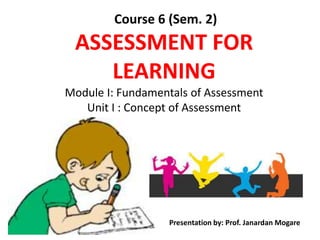Unit 1 a) Meaning nature and functions of Assessment
•Als PPTX, PDF herunterladen•
3 gefällt mir•4,361 views
Melden
Teilen
Melden
Teilen

Empfohlen
Empfohlen
Weitere ähnliche Inhalte
Was ist angesagt?
Was ist angesagt? (20)
Test, measurement, assessment, evaluation and testing

Test, measurement, assessment, evaluation and testing
Andere mochten auch
Hassun El ZafarThe Nature of Assessment: The student perspective on the purpose of assessmen...

The Nature of Assessment: The student perspective on the purpose of assessmen...SHU Learning & Teaching
Andere mochten auch (20)
Assessment Careers: Enhancing learning pathways through assessment

Assessment Careers: Enhancing learning pathways through assessment
The Nature of Assessment: The student perspective on the purpose of assessmen...

The Nature of Assessment: The student perspective on the purpose of assessmen...
Ähnlich wie Unit 1 a) Meaning nature and functions of Assessment
Ähnlich wie Unit 1 a) Meaning nature and functions of Assessment (20)
Assessment for learning chapter 1 - copy-converted

Assessment for learning chapter 1 - copy-converted
assessmentforlearningchapter-1-copy-converted-200124131944.pptx

assessmentforlearningchapter-1-copy-converted-200124131944.pptx
Unit 1.Introduction of Assessment in Education.pptx

Unit 1.Introduction of Assessment in Education.pptx
Assessment For Learning -Second Year -Study Material TAMIL NADU TEACHERS EDUC...

Assessment For Learning -Second Year -Study Material TAMIL NADU TEACHERS EDUC...
Note on Evaluation and Assessment in Nursing Education (Part - 01)

Note on Evaluation and Assessment in Nursing Education (Part - 01)
Unit 1 a) Meaning nature and functions of Assessment
- 1. Course 6 (Sem. 2) ASSESSMENT FOR LEARNING Module I: Fundamentals of Assessment Unit I : Concept of Assessment Presentation by: Prof. Janardan Mogare
- 2. Meaning: Assessment is a process by which information is obtained relative to some known objective or goal. Assessment is a broad term that includes testing. A test is a special form of assessment. Tests are assessments made under contrived circumstances especially so that they may be administered. Assessment
- 3. In other words, all tests are assessments, but not all assessments are tests. We test at the end of a lesson or unit. We assess progress at the end of a school year through testing, and we assess verbal and quantitative skills Assessment
- 4. Definitions Allen (2004): Assessment involves the use of empirical data on student learning to refine programs and improve student learning. Huba and Freed (2000): Assessment is the process of gathering and discussing information from multiple and diverse sources in order to develop a deep understanding of what students know, understand, and can do with their knowledge as a result of their educational experiences; the process culminates when assessment results are used to improve subsequent learning.
- 5. Erwin (1991): Assessment is the systematic basis for making inferences about the learning and development of students. It is the process of defining, selecting, designing, collecting, analyzing, interpreting, and using information to increase students’ learning and development. Palomba and Banta (1999): Assessment is the systematic collection, review, and use of information about educational programs undertaken for the purpose of improving student learning and development.
- 6. Nature of assessment Assessment is embedded in the learning process. It is tightly interconnected with curriculum and instruction. As teachers and students work towards the achievement of curriculum outcomes, assessment plays a constant role in informing instruction, guiding the student’s next steps, and checking progress and achievement.
- 7. Nature of assessment Classroom assessment involves students and teachers in continuous monitoring of students’ learning. It gives students a measure of their progress as learners. It provides opportunity for close observation of students in the process of learning. It helps in collection of frequent feedback on students’ learning and how they respond to particular teaching approaches. Assessment has profound impact on the self- esteem of pupils, which is critical influence on learning. Uses variety of strategies.
- 8. Thus ‘assessment’ includes all those activities undertaken by teachers, and by their students in assessing themselves, which provide information to be used as feedback to modify the teaching and learning activities in which they are engaged.
- 9. Four fundamental elements of learner-centred assessment
- 10. • Monitoring the progress • Decision making • Screening • Diagnostic process • Placement of students in remedial courses Functions of assessment:
- 11. • Instructional planning • Evaluation of instructional programme. • Feedback • Motivation Functions of assessment:
